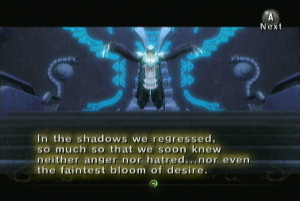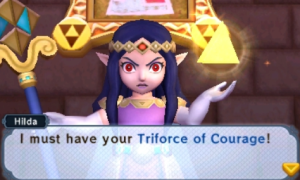Piece of Heart: It’s All Political
Posted on March 27 2015 by Alexis S. Anderson
 Welcome to the eighth installment of Piece of Heart, where we look at The Legend of Zelda series through the eyes of a literary professor and examine how its literary elements enhance the gaming experience. This week’s lesson is titled “It’s All Politics”. While I don’t think that any Zelda game was created as an analogy for a real-world political situation, it does usually surround war and the dangers of a power-hungry government.
Welcome to the eighth installment of Piece of Heart, where we look at The Legend of Zelda series through the eyes of a literary professor and examine how its literary elements enhance the gaming experience. This week’s lesson is titled “It’s All Politics”. While I don’t think that any Zelda game was created as an analogy for a real-world political situation, it does usually surround war and the dangers of a power-hungry government.
This lesson argues that no piece of literature is devoid of political bias, because every author has a personal political preference that is likely to present itself in that author’s works. Likewise, every person who has ever had a hand in creating a Zelda game has left his or her political footprint on it, it’s just a matter of spotting the tracks.
Stories are written to change something in the reader, and powerful texts can influence an entire society through these individual alterations. Political writing generally targets one social way of thinking, while promoting another; characters can be introduced to represent a political figure or a society. Unfortunately, a deliberately political work won’t age or travel well, because outside of the context of its time period and setting the political statements don’t make sense. The most affecting political works engage the realities of this world; they harp on human problems in both social and political realms, and address the rights of people and the wrongs of those in power.
The issue with Zelda politically is that it hasn’t ever specifically targeted a single event in history and made a statement about it, doing so would only put Nintendo in a controversial situation and negatively affect the future of the Zelda franchise. Luckily, this leads to broader statements available for analysis, which leave the situations’ real-world association up to the reader to delegate. This can be problematic, as players will all have different experiences, and may interpret things incorrectly.
For instance, in Four Swords Adventures, Shadow Link captures the seven Maidens so he can use their power  to reanimate Vaati. The four Links’ journey surrounds rescuing all of these girls and defeating Vaati. One could connect this to the Boko Haram kidnappings which spurred the “Bring Back Our Girls” campaign, but bear in mind that this terrorist organization has kidnapped thousands of people, not just seven; though it’s a thinly supported link and impossible timetable-wise, it can be defended and does indeed teach that the kidnapping of virtuous and pure women (as young girls are often viewed) is an act of monstrous evil, and that those brave and caring enough to must fight a long arduous battle on the way to saving the victims. So long as a proper message is being received, the connection isn’t all that important in these broad occasions, as it can be applied many times over to a number of similar political situations.
to reanimate Vaati. The four Links’ journey surrounds rescuing all of these girls and defeating Vaati. One could connect this to the Boko Haram kidnappings which spurred the “Bring Back Our Girls” campaign, but bear in mind that this terrorist organization has kidnapped thousands of people, not just seven; though it’s a thinly supported link and impossible timetable-wise, it can be defended and does indeed teach that the kidnapping of virtuous and pure women (as young girls are often viewed) is an act of monstrous evil, and that those brave and caring enough to must fight a long arduous battle on the way to saving the victims. So long as a proper message is being received, the connection isn’t all that important in these broad occasions, as it can be applied many times over to a number of similar political situations.
Another connection, stronger yet equally impossible in terms of being purposely instituted by the game’s creators, comes from the Twili in Twilight Princess. The Twili were exiled to the Twilight Realm after their ancestors, the dark interlopers, attempted a conquest of the sacred realm. During the proceedings of Twilight  Princess, Zant takes control of the Twilight realm, and feels he is entitled to also rule the world of light. This situation is similar to the rise of Nazi Germany following World War I; the Treaty of Versailles had given Germany the short end of the stick so to speak as punishment for its aggressions during the war, this lead to the major depression in Germany that allowed Hitler to take power. Though unintentional, Zant’s character can be viewed as representative of Hitler (but of course Hitler was leagues worse than Zant ever was). He wants the Twili to become the dominant race in both worlds, he attacks and conquers the majority of the provinces in Hyrule, and is cunning, but is personally bolstered much through propaganda and acting rather than actual intimidation. The lessons learned are the same as those taught in history classes–at least US history classes–that in the long term, reform of a belligerent is always smarter than just punishment and that out of discontent grow insurrections.
Princess, Zant takes control of the Twilight realm, and feels he is entitled to also rule the world of light. This situation is similar to the rise of Nazi Germany following World War I; the Treaty of Versailles had given Germany the short end of the stick so to speak as punishment for its aggressions during the war, this lead to the major depression in Germany that allowed Hitler to take power. Though unintentional, Zant’s character can be viewed as representative of Hitler (but of course Hitler was leagues worse than Zant ever was). He wants the Twili to become the dominant race in both worlds, he attacks and conquers the majority of the provinces in Hyrule, and is cunning, but is personally bolstered much through propaganda and acting rather than actual intimidation. The lessons learned are the same as those taught in history classes–at least US history classes–that in the long term, reform of a belligerent is always smarter than just punishment and that out of discontent grow insurrections.
 One final example appears in A Link Between Worlds and can be paralleled by both an instance from World War II and modern terrorism. The land of Lorule was nearly obliterated when its Triforce was destroyed, so Princess Hilda attempted to steal Hyrule’s Triforce to save her kingdom without giving too much consideration to the damage that would do to Hyrule. This sacrificing of innocent lives for the sake of nationalism and to save one particular set of persons is paralleled by the US’s dropping of atomic bombs on Hiroshima and Nagasaki during World War II and its entering Iraq following word that Saddam Hussein had weapons of mass destruction.
One final example appears in A Link Between Worlds and can be paralleled by both an instance from World War II and modern terrorism. The land of Lorule was nearly obliterated when its Triforce was destroyed, so Princess Hilda attempted to steal Hyrule’s Triforce to save her kingdom without giving too much consideration to the damage that would do to Hyrule. This sacrificing of innocent lives for the sake of nationalism and to save one particular set of persons is paralleled by the US’s dropping of atomic bombs on Hiroshima and Nagasaki during World War II and its entering Iraq following word that Saddam Hussein had weapons of mass destruction.
The US plays the role of Lorule as dropping atomic bombs was a response to Japan’s attack on Pearl Harbor and a quick way to end the war so fewer soldiers’ lives would be lost, and invading Iraq was justified by America’s hope “to disarm Iraq of weapons of mass destruction, to end Saddam Hussein’s support for terrorism, and to free the Iraqi people.” Unfortunately in both situations, more lives were lost in the US’s retaliation than in the attacks on the US. We could debate the merits of the US’s decision to use atomic weapons to end World War II and enter a war in Iraq, but we’d get nowhere because of the controversial nature of these issues. We do know, though, that Hilda’s plan didn’t work out as hoped and she became a sort-of tragic hero towards the end of A Link Between Worlds. It was only through peaceful negotiations and collaboration between kingdoms that set things right in Lorule; depending on your view of America’s actions, this is a message that you might want politicians to take to heart.
I understand that these examples are very sensitive subjects, and I sincerely hope I have not said anything offensive. I probably could have used less intense situations, but the point is that these larger offenses are the kinds that shape our society; they will be more widely recognized and the lessons to be learned reflected in a deeper way. I must apologize about this segment being more speculation and assumption than analysis, but it happens often when analyzing literature that the reader must take a shot in the dark in order to find the intended connection, and in the end it’s all about what you as the reader take away from the text (or as a player, take away from the game).
The next installment will avoid connections of this level to the real world, and return to more precise in-game analyses. What did you think of this week’s lesson? Given the controversial nature of these examples, do you think it’s at all plausible that the developers’ put the references in on purpose? Give your thoughts in the comments and feel free to share your own political findings from throughout the Zelda series!

Alexis S. Anderson is a Senior Editor at Zelda Dungeon who joined the writing team in November, 2014. She has a JD from the UCLA School of Law and is pursuing a career in Entertainment and Intellectual Property Law. She grew up in the New Jersey suburbs with her parents, twin brother, and family shih-tzu.



